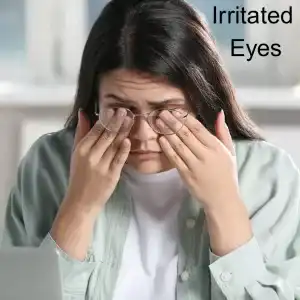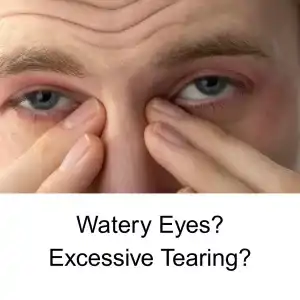By Qineng Tan, L.Ac., Ph.D. and Xiaomei Cai, L.Ac., Ph.D.

Watery eyes, also known as excessive tearing or epiphora, can be a frustrating and uncomfortable symptom, especially when paired with itchiness, redness, burning, or blurry vision. For many people, this problem flares up seasonally due to allergies, while others deal with chronically runny eyes year-round.
In Traditional Chinese Medicine (TCM), watery eyes are a signal that the body is out of balance. Acupuncture and Chinese herbal medicine can help relieve discomfort, and get to the root cause of why your eyes won’t stop watering.
What Causes Watery Eyes?
Watery eyes can stem from a variety of different health issues, ranging from environmental factors to chronic conditions. Some of the most common causes of water eyes include:
- Seasonal allergies (allergic conjunctivitis) – One of the most common causes of itchy, watery eyes, especially in spring (hay fever) and fall. Pollen, grasses, and other airborne allergens trigger inflammation in the eyes.
- Dry eye syndrome – Ironically, overly dry eyes often produce excess tears as a reflex.
- Blocked tear ducts – A blockage in the tear drainage system causes tears to back up and spill over the lower eyelid.
- Eye infections – Pink eye (conjunctivitis), blepharitis (inflammation of the eyelid), or other infections can trigger watery discharge.
- Irritants – Smoke, wind, strong odors, dust, or chemical exposure can cause the eyes to tear up.
- Aging – Tear production and drainage efficiency change with age, increasing the likelihood of both dry eyes and tearing.
- Eyelid problems – Conditions like ectropion (outward-turning eyelid) or entropion (inward-turning eyelid) can interfere with proper tear drainage.
- Autoimmune disorders – Conditions such as Sjögren’s syndrome can affect tear glands and eye moisture.
- Refractive surgeries or contact lens irritation – These may alter tear film stability or increase sensitivity.
Conventional Treatment for Watery Eyes

In Western medicine, diagnosing watery eyes typically involves an eye exam with a focus on tear production, drainage, and any signs of irritation or inflammation. Tests may include a Schirmer test to measure tear production,Fluorescein staining to assess eye surface health, and/or dye tests to evaluate tear duct function.
Treatments depend on the underlying cause and may include:
- Antihistamines or corticosteroid eye drops for allergies
- Artificial tears or lubricating drops for dry eye syndrome
- Warm compresses and eyelid scrubs for blepharitis
- Antibiotics for infections
- Surgical procedures to correct blocked tear ducts or eyelid malposition
While many people find temporary relief through these treatments, they may not always resolve chronic watery eyes or recurring eye infections. Acupuncture and Traditional Chinese Medicine can offer another, more holistic approach.
TCM Theory – Root Causes of Watery Eyes
In Traditional Chinese Medicine, the eyes are known as “the windows of the Liver.” This doesn’t refer to the physical liver as we usually think of it in Western anatomy, but rather the Liver organ system in TCM theory, which is responsible for storing blood and ensuring the smooth flow of Qi (vital energy) throughout the body.
The Liver is closely connected to the eyes, so any imbalance in Liver Qi or Liver Blood can show up as eye issues—blurriness, dryness, sensitivity, itchiness, or excessive tearing.
Other contributing factors may include:
- Liver Wind or Liver Heat – These patterns can manifest as itchy, red, or irritated eyes, often seen with allergies.
- Kidney Yin Deficiency – When the body’s fluids are deficient, this can lead to dry eye syndrome with reflex tearing.
- Spleen Qi Deficiency – Leads to poor fluid transformation, which may cause congestion or excess dampness.
- External Wind or Heat pathogens – Allergens or environmental irritants can invade the body and disrupt the balance of the organ systems, causing acute symptoms like watery, itchy eyes.
Can Acupuncture Help Watery Eyes?

A TCM practitioner will take a thorough health history and examine your tongue, pulse, and symptoms to determine the root cause of your watery eyes. A treatment protocol may include acupuncture to balance Liver Qi, clear Wind and Heat, and improve fluid metabolism, Chinese herbal formulas to nourish Liver and Kidney systems or clear Dampness and Heat, and dietary therapy to reduce phlegm or support Yin and Blood.
Your acupuncturist will also recommend dietary adjustments that can help clear excess liver heat, such as mung beans, dark, seaweed, arugula, celery, grass fed beef and liver, organic fertile eggs, flax oil, and sesame seeds.
For liver health, is it usually best to avoid alcohol, fried foods, sugar, processed foods, cashews and peanuts, and nightshade vegetables like eggplant and bell peppers.
A randomized controlled trial examined the efficacy of acupuncture in treating dry eye syndrome, a condition that can paradoxically cause reflex tearing. Participants receiving acupuncture reported significant improvements in tear film stability and symptom relief compared to the control group.
A clinical study published in the Journal of Traditional Chinese Medicine investigated the effects of acupuncture on 34 patients suffering from epiphora due to lacrimal duct dysfunction. The treatment involved specific acupuncture protocols aimed at restoring proper tear drainage. The results indicated significant improvement in symptoms, suggesting that acupuncture can be an effective non-invasive treatment for certain types of excessive tearing.
By restoring balance to the underlying systems involved—especially the Liver—TCM not only helps reduce excessive tearing but can also address related symptoms like eye fatigue, itching, redness, and even headaches.
Acupuncture Near Me for Watery Eyes in West Los Angeles
If you’re struggling with constant tearing, itchy eyes, or other irritating symptoms related to allergies, dry eyes, or sinus issues, acupuncture and Traditional Chinese Medicine may offer the relief you’ve been looking for. At Art of Wellness Acupuncture in West Los Angeles, we take a whole-body approach to treating eye conditions by restoring balance and improving circulation through personalized acupuncture treatments and herbal support. Whether your symptoms are seasonal or persistent, don’t hesitate to reach out for a consultation.
*This article is for education from the perspective of Traditional Chinese Medicine only. The education provided by this article is not approved by FDA to diagnose, prevent, treat and cure human diseases. It should not stop you from consulting with your physician for your medical conditions. Traditional Chinese Medicine is based on Qi, which is an invisible force that usually cannot be observed by modern science. Because science focuses on testing ideas about the natural world with evidence obtained through observation, these aspects of acupuncture can’t be studied by science. Therefore acupuncture and Chinese herbs are often not supported by double-blind, randomized trials, and they are considered alternative medicine therapies in the United States.
